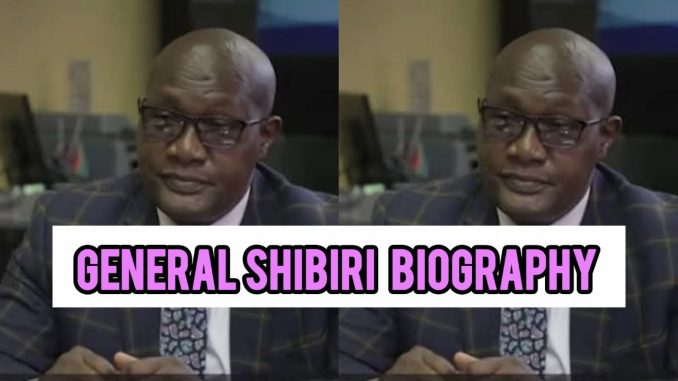
General Richard Shibiri Biography
General Richard Shibiri was born on May 18, 1968, in KwaZulu-Natal, South Africa. He rose through the ranks of the South African Police Service (SAPS) to become a well-known senior officer who has been publicly identified in media reports as a leader in organised crime investigations. His career has placed him at the centre of high-profile policing operations and, more recently, under intense public scrutiny as testimony at the Madlanga Commission of Inquiry has linked him to alleged interference in a major mvrder investigation. General Richard Shibiri is 57 years old as of 2025.
Shibiri’s early life and private family details remain relatively private in public records. What is clear from available reporting is that his long service in law enforcement made him a recognizable figure within the national organised crime structure of SAPS. Over decades on the job, he gathered operational experience that led to senior appointments and frequent interaction with provincial and national investigative units. His public profile shifted dramatically after recent witness testimony at the Madlanga Commission placed him at the heart of troubling claims about how certain investigations were handled.
General Richard Shibiri Career
General Shibiri built a career in policing focused on tackling organised and serious crime. By virtue of his rank and appointment, he came to oversee or interact closely with the National Organised Crime Unit and related task teams. In that capacity he would have been responsible for strategic direction, oversight, inter-agency liaison and, when required, for briefing investigative teams and other senior officials. Public references describe him as a senior officer who operated at the national level in matters of organised crime.
Throughout his career, Shibiri was involved in decisions and briefings that shaped how complex investigations were handled. Senior policing roles like his involve balancing case priorities, protecting active investigators, coordinating with prosecutors, and interacting with forensic services. Many officers in equivalent roles also find themselves managing political and media scrutiny, and the need to protect sensitive evidence while ensuring cases proceed through court. Shibiri’s leadership profile in media coverage reflects these typical senior policing responsibilities, even as the current inquiries examine whether those responsibilities were fulfilled properly in specific cases.
Public reporting shows that he was called upon to receive briefings from investigating teams and to provide guidance on threats and safety. In highly charged investigations — especially those alleging links between organised crime and public officials — a national head of organised crime would be expected to coordinate protective measures and to ensure evidence integrity. It is precisely those kinds of actions that witnesses at the Madlanga Commission say were present, but in a context that has raised alarm and suspicion rather than reassurance.
General Richard Shibiri Controversies And Scandal
In October 2025, testimony at the Madlanga Commission of Inquiry introduced serious allegations involving the handling of the murder investigation into engineering whistleblower Armand Swart, and implicated senior policing figures, including General Richard Shibiri. A witness referred to as “Witness A” told the commission that during a meeting Shibiri allegedly told investigators that there were “three envelopes” circulating as possible bribes intended to influence bail decisions for suspects in the Swart matter — one envelope for the magistrate, one for the prosecutor, and one for investigating officers.
The witness said the remark left the investigative team feeling baited and compromised, and raised fear that evidence or processes might be influenced. Multiple news outlets covered this testimony, making it a central element of recent public debate. Because these are commission testimonies and media reports, they remain allegations and are still subject to legal and procedural scrutiny.
Beyond the “three envelopes” remark, Witness A told the commission that investigators were warned to “look after themselves” because suspects were connected to dangerous figures, including individuals from the taxi industry and alleged cartel networks. That warning reportedly heightened concerns among investigators, some of whom were later moved into secure accommodation and given 24-hour protection amid fear for their safety. These facts, as given in testimony, suggest investigators felt threatened from within and outside the police service while working on the Swart case.
Another major allegation that came up at the commission concerns forensic evidence. Witnesses reported that ballistic reports linking cartridges and firearms across scenes were missing, altered or required rewriting. One investigator said that key forensic links expected from ballistic analyses were omitted from an initial report and that the analysis failed to mention important connections between bullet cartridges recovered in different incidents. The witness said they believed there had been tampering or undue influence over forensic results, which, if true, would seriously undermine the integrity of the criminal justice process. News organisations covering the hearing reported these claims as part of a broader narrative suggesting potential interference and obstruction in the investigation.
Testimony publicly linked Katiso “KT” Molefe to the Swart killing and suggested he might be the mastermind behind the plot. Witness A also testified to WhatsApp communications between a detective and alleged hitmen that pointed to premeditated planning. The same testimony suggested Molefe and others might have links to wider cartel networks and to underworld figures such as Jothan “King Mswazi” Msibi.
The commission’s hearings therefore painted a picture of a murder allegedly connected to organised crime, with simultaneous claims that elements inside or close to law enforcement may have tried to influence outcomes or suppress evidence. These are serious claims currently being examined by the commission and are being treated as allegations until proven otherwise in court or through the commission’s findings.
Media coverage has explicitly named Shibiri in connection with the envelope allegation and reported that some senior police witnesses and provincial leaders believed the “envelope” comment could explain earlier reports of attempted bribery in the case. Witnesses at the commission said they felt compromised after the meeting and questioned whether senior leadership could be fully trusted to shield the investigation from interference. At the same time, official processes such as the commission of inquiry exist precisely to establish facts, hear contested evidence under oath, and recommend reforms or prosecutions where necessary. The presence of high-level names in testimony underscores how intrusive organised criminal influence can appear when allegations point toward collusion or interference.
Supporters of due process stress two important points when reading these developments. First, commission testimony is not the same as a criminal conviction; the purpose of the Madlanga Commission is fact-finding and recommendation. Second, allegations reported in the press should be read with cautious language until the commission’s findings or criminal prosecutions — if any — establish what happened in law. Journalists covering the hearings have been careful to note when claims come from specific witnesses and when the matters remain under inquiry. This distinction helps to protect both the integrity of the legal process and the rights of individuals who are named in media reports.
Conclusion
General Richard Shibiri allegations are serious and have provoked public concern about corruption and interference inside the criminal justice system. At the same time, it is essential to remember that what has been presented at the commission so far is testimony and allegation. The Madlanga Commission exists to examine these claims, weigh the evidence and make findings and recommendations. For readers seeking clarity, the final commission report and any consequent criminal or disciplinary outcomes will be the most authoritative sources about what actually happened.
FAQs
Who is General Richard Shibiri?
General Richard Shibiri is a senior South African Police Service officer who has been publicly identified as a national figure in organised crime investigations. Recent commission testimony has placed him in the spotlight for alleged comments and actions around a major murder investigation.
What are the “three envelopes” allegations?
The “three envelopes” allegation comes from testimony at the Madlanga Commission where a witness said Shibiri told investigators that three envelopes — for a magistrate, a prosecutor and investigating officers — were “floating around” as potential bribes to influence bail for suspects. This was presented as an allegation in commission testimony.
What is the Madlanga Commission investigating?
The Madlanga Commission is a formal inquiry tasked with investigating criminality, political interference, and corruption within the criminal justice system. Its remit includes hearing testimony, examining evidence and issuing findings and recommendations. The Swart murder and allegations of interference are among the matters being examined.
Was evidence tampered with in the Swart case?
Witnesses at the commission have alleged that ballistic reports and forensic links were omitted or tampered with, and that the initial analyses did not reflect expected connections between cartridges and firearms. These are allegations being investigated by the commission.

Fred Justin is a journalist and writer who focuses on local food and cooking. For nine years he has reported on neighborhood restaurants, farmers’ markets, recipes, and food trends, helping readers find great places to eat and understand how food is made. He holds a BSc and an MSc in Food Science and Biotechnology, which gives him scientific expertise in ingredients, food safety, and production that strengthens his writing.
Leave a Reply